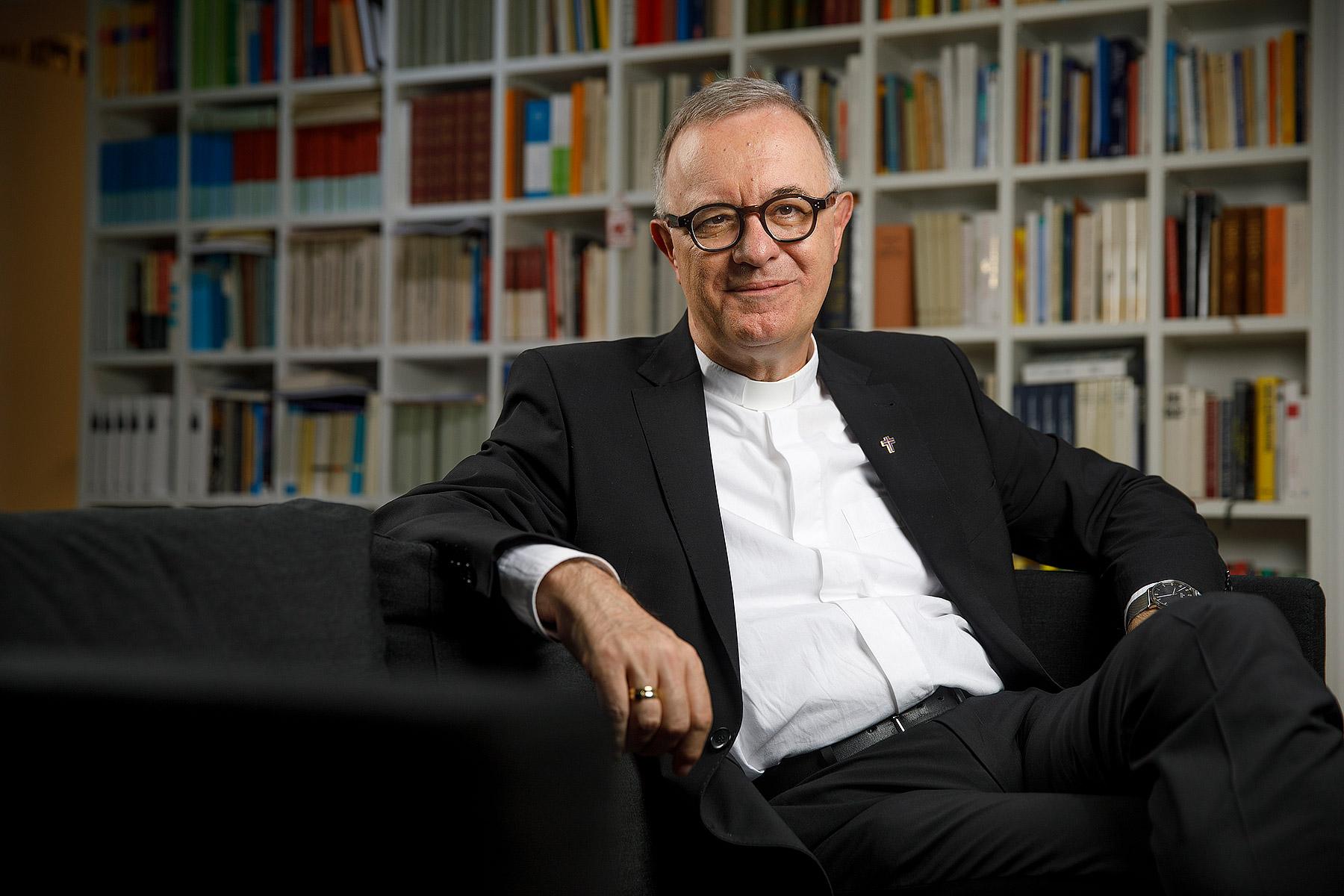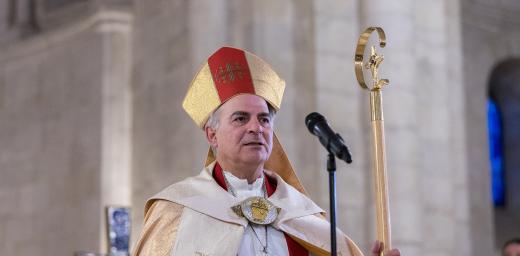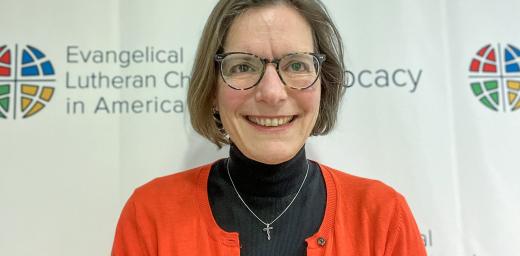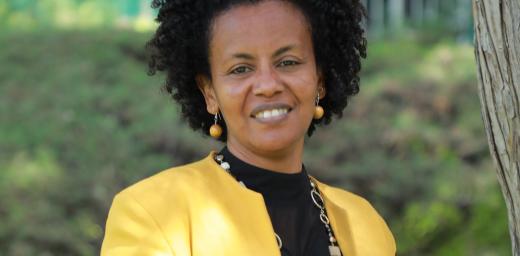Getting to know the diversity of a denominational family

Rev. Dr Frank Otfried July, LWF Council member and Bishop of the Evangelical Lutheran Church in Württemberg. Photo: EMH/Gottfried Stoppel
LWF Council member Bishop Frank Otfried July from the Evangelical Lutheran Church in Württemberg
(LWI) - “Christ at the center repeatedly calls us to unity in diversity,” says Rev. Dr Frank Otfried July who has been bishop of the Evangelical Lutheran Church in Württemberg since September 2005 and has a long-standing commitment to the Lutheran World Federation (LWF).
He spoke with the Lutheran World Information about perspectives gained from his multiple engagements for the Lutheran communion, as well as the situation of the churches in Germany, especially the Evangelical Lutheran Church in Württemberg.
You have been and still are connected to the LWF in many ways. What does this worldwide Lutheran communion mean to you personally?
For me it has become an important life experience and area of learning. The local church is truly church, but not the whole church. In the LWF, one gets to know the diversity of a denominational family, that is the perspective of minority and majority churches from different contexts and cultures.
In addition, the LWF places a lot of emphasis on ecumenism and takes responsibility in the fields of development cooperation, justice, peace, and the integrity of creation.
Looking back on the past years, what developments have you witnessed and how have the connections to the global LWF communion developed?
My engagement in the LWF began in 2010 with the historic prayer for reconciliation with the Mennonites at the Eleventh Assembly in Stuttgart, followed by the persistent development of a deeper concept of the LWF as communion, that is church fellowship. A highlight, of course, was the celebration of the Reformation Commemoration in Windhoek during the Twelfth Assembly in 2017 and the developments leading up to this event.
In our world, which is undergoing immense transformations, it is still a prominent task for the LWF to proclaim the gospel of Jesus Christ globally and to be the voice of the voiceless.
In our globalized world we must make it clear that the church has had a global awareness since its beginnings. In our world, which is undergoing immense transformations, it is still a prominent task for the LWF to proclaim the gospel of Jesus Christ globally and to be the voice of the voiceless. The importance of the LWF is growing, thus we need to adapt communication and structural processes accordingly. The good experiences with the Reformation Commemoration have encouraged us to take on these tasks.
You are chairing the board of trustees of the Lutheran Foundation for Ecumenical Research – and the Institute for Ecumenical Research in Strasbourg is instrumental in the LWF's dialogue processes. What topics are currently on its agenda?
We must continue to patiently work for theological understanding in the traditional dialogues. Even if much has already been achieved, questions of ministry or the understanding of the church remain to be discussed. Trust between the partners involved has grown and strengthened the dialogue with the other churches, be it the dialogue with the Roman-Catholic church, the Orthodox churches or the Pentecostal and Mennonite churches.
Of course, the question remains: What does ecumenical dialogue work mean in the future? The situation of the churches has changed in many countries. New questions arise, such as cooperation on ethical questions. What can Lutheran theology contribute? Also, it is important to include the different theological traditions and approaches of a worldwide ecumenism in the dialogue work.
In Germany you were elected Chairperson of the German National Committee of the LWF (GNC/LWF) in December 2018. What is the role of the German LWF member churches in Europe and for the global Lutheran communion?
The eleven German LWF member churches should consciously place their material and spiritual gifts at the service of the Lutheran communion in Europe and worldwide. The Reformation provides us with our own history and experience in a specific social context. At the same time, we want to be perceived as LWF member churches with open ears for others.
Only recently we had a delegation from eleven different churches isiting of the Evangelical Lutheran Church in Württemberg. There were talks, visits, analyses, discussions, and church services. We listened to what they had to say to us. In the LWF this exchange should be standard. The churches of the GNC/LWF are willing to make their contribution to this.
What topics are on the agenda of your church at the moment?
The Evangelical Lutheran Church in Württemberg is a Lutheran church with a strong pietistic tradition, which still has a considerable influence on the church today.
Our church constitution provides for the direct election of members of the synod and the formation of church-political "parties". This accounts for many a controversial discussion in this governing body of the church. The synod is a good reflection of the different theological positions and parties within the church. However, Christ at the center repeatedly calls us to unity in diversity.
At present we are challenged by the prognoses on membership development in the German churches generally, but also in Württemberg. By 2060 our membership may decline to half of today's approximately two million members. Demographic developments in our ageing society and decline of binding power of traditions are among the causes. At the same time, we are experiencing impressive new initiatives in our church.
The proposals about what renewal, increased relevance and shaping the future should look like differ. We are an established traditional church in a state of flux which still has many gifts and talents with which it has been entrusted. With God's help, we can use and multiply these gifts. In dealing with the process of transformation of society, we should have the courage to persist in the Gospel: to have faith and creativity, being hopeful and humble.
Another important topic is the role of the churches in Europe. I am very committed to ensuring that in a changing Europe we as churches and Christians "seek the welfare of Europe" (Jer 29:7) – a Europe of peace, justice and mercy. The Gospel opens – and does not erect barriers! The churches should use their networks – including the LWF – to make it clear that the Christian faith has the power to shape the people of our time, whether in Germany, Europe or worldwide.
The Lutheran World Federation is a global body that shares the work and love of Christ in the world. In this series, we profile church leaders and staff as they discuss topical issues and set out ideas for building peace and justice in the world, ensuring the churches and communion grow in witness and strength.





